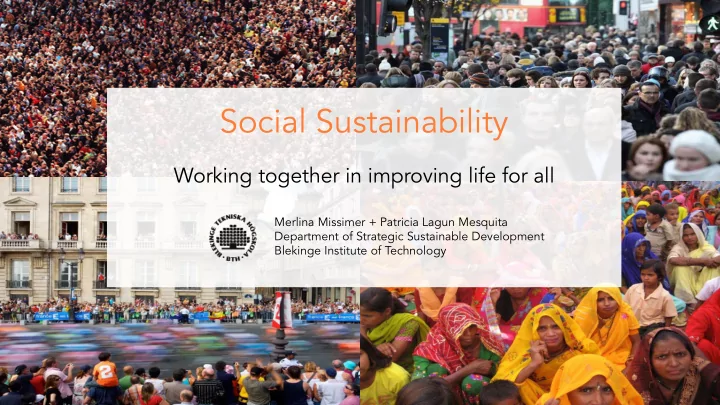

Social Sustainability Working together in improving life for all Merlina Missimer + Patricia Lagun Mesquita Department of Strategic Sustainable Development Blekinge Institute of Technology
Are ecosystems important for human life on earth?
Are social systems important for human life on earth?
What do we mean by social systems? Individuals connected into a system through human relationships and interaction
Humanity Environment (and our economy) is dependent on... Society ...a healthy so society ty ... Economy ...on a healthy pl planet .
In In order to ac achieve a a su susta stainable so society ty... ... Environment Nat Nature must not be systematically degraded Society So Social system ems must not be systematically degraded Economy Ec Econ onomic omic activ ivit ity must align with such requirements.
There is another reason why social sustainability is important …
Chi Chile Inrease in metro fair Cost of living + Inequality
In In order to ac achieve a a su susta stainable so society ty... ... Nat Nature must not be systematically degraded Social system So ems must not be Le Lebanon systematically degraded Ec Econ onomic omic activ ivit ity must Taxation including on what´s app align with such requirements. Corruption + standard of living
Haiti Ha Economic Crisis post disaster
Fight for independence Catal Cataloni onia
Societal transitions and change of any kind require social acceptance and social sustainability
15
So what do we mean by social sustainability?
Social sustainability is about the basic conditions that are necessary for the social system to continue. This basic condition = not eroding core social dynamics
Self-organization Learning Trust Cor Core Soc e Social al Dy Dynami namics Diversity Common Meaning 19
Sustainable Social System In a socially sustainable society, people are not subject to structural obstacles to… … health • …influence • …competence • …impartiality • …meaning-making •
St Struct uctur ural al Obstacl acles es Structural obstacles refers to social constructions - political, economic and cultural - which are firmly established in society upheld by those with power and, are difficult or impossible to overcome or avoid by the people exposed to them. - Formal: Official Procedures, routines, rules, regulations and policies, laws and legislation - Informal: Cultural norms and values, customs, organizational practices and patterns
People are not subject to structural obstacles to … health This means that people are not exposed to social conditions that systematically undermine their possibilities to avoid injury and illness; physically, mentally or emotionally, e.g. by lack of access to medical care, sufficient wages to make a decent living
People are not subject to structural obstacles to … influence 5 This means that people are not systematically hindered from participating in shaping the social systems they are part of, e.g. by suppression of free speech or lack of particaption opportunities 5
People are not subject to structural obstacles to … competence This means that people are not systematically hindered from learning and developing competence individually and together, e.g. by obstacles for education
People are not subject to structural obstacles to … impartiality This means that people are not systematically exposed to partial treatment, e.g. by discrimination or unfair selection to job positions, or through corruption
People are not subject to structural obstacles to …meaning-making This means that people are not systematically hindered from creating individual meaning and co-creating common meaning, e.g. by suppression of cultural expression or obstacles to co-creation of purposeful conditions.
Di Discussion How do you see your field of work connecting to social sustainability? In what ways might it help overcome existing structural § obstacles? In what ways might it contribute to new ones? §
We offer support to work strategically with these issues Awareness Creative Solutions Future Present Baseline Decide on Priorities Image: Adapted from the Natural Step 2008
Contact Merlina Missimer Department of Strategic Sustainable Development Blekinge Institute of Technology mis@bth.se
Recommend
More recommend